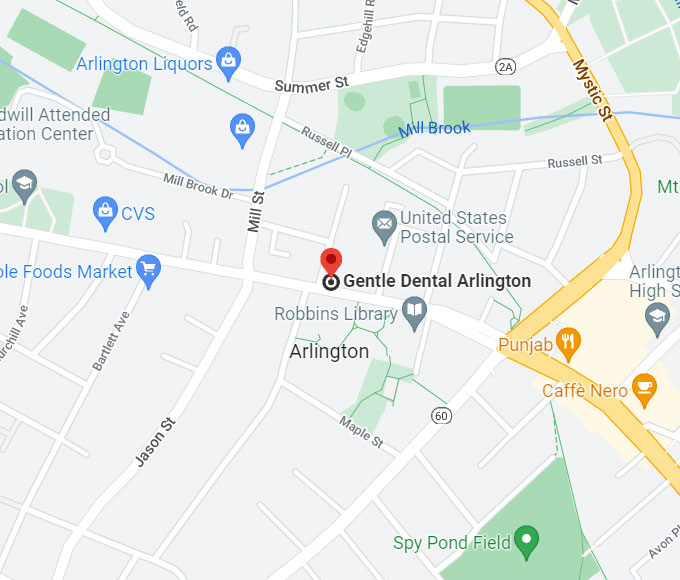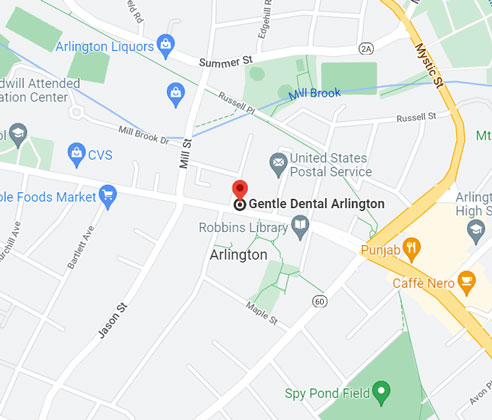- Locations
- Locations
- Arlington
- Attleboro
- Belmont
- Beverly
- Boston
- Braintree
- Brockton
- Brookline
- Burlington
- Cambridge
- Chelmsford
- Concord, NH
- Derry, NH
- Dover, NH
- Exeter, NH
- Franklin
- Hanover
- Hudson
- Keene, NH
- Malden
- Manchester, NH
- Medford
- Methuen
- Milford
- Nashua, NH
- Natick
- New Bedford
- North Andover
- Norwood
- Peabody
- Quincy
- Rochester, NH
- Saugus
- Seekonk
- Somerville
- Stoughton
- Wakefield
- Waltham
- Worcester
- Dental Services
- Payment Options
- Patient Resources
- About Us

Teeth Whitening in Arlington, MA
Transform your smile in just one visit with professional teeth whitening in Arlington, MA, to remove years of stains from coffee, tea, and tobacco, revealing the brighter, more confident smile you deserve.
Dental Office Hours
Monday 8:30 AM - 5:00 PM
Tuesday 9:00 AM - 6:00 PM
Wednesday 9:00 AM - 5:00 PM
Thursday 9:00 AM - 6:00 PM
Friday 9:00 AM - 4:00 PM
Saturday 9:00 AM - 3:00 PM
Sunday CLOSED
More Information
Metered, street-parking available. Can be accessed via MBTA bus, 67, 77, 79.
Dental Office Hours
Monday 8:30 AM - 5:00 PM
Tuesday 9:00 AM - 6:00 PM
Wednesday 9:00 AM - 5:00 PM
Thursday 9:00 AM - 6:00 PM
Friday 9:00 AM - 4:00 PM
Saturday 9:00 AM - 3:00 PM
Sunday CLOSED
More Information
Metered, street-parking available. Can be accessed via MBTA bus, 67, 77, 79.
Gentle Dental Arlington Reviews
It is always an excellent experience with Dr. Richa Bhatt. I so appreciate her expertise, her professionalism and her sincerity.
Dr. Bhatt is excellent, explains what she's seeing and all the options. I have been going there for many years and have been happy with their work. Recently, I had a cleaning where I asked to get rid of some teeth stains for a public function where I'd probably have to get pictures, and Dr. Khalil obliged, doing in one cleaning session what a month of Crest white strips apparently couldn't!
Dental Services in Arlington
Transform your smile in just one visit with professional teeth whitening in Arlington, MA, to remove years of stains from coffee, tea, and tobacco, revealing the brighter, more confident smile you deserve.
Preventive Care
Restorative Care
Crowns and Bridges
Dental Fillings
Extractions
Gum Treatments
Implants
Oral Surgery
Partial and Full Dentures
Root Canals
Wisdom Teeth Extractions
Orthodontics
Additional Services
How Does Teeth Whitening Work?
Teeth whitening is a straightforward process. Whitening products typically contain either hydrogen peroxide or carbamide peroxide, which act as bleaching agents. These agents break down stains into smaller particles, reducing the intensity of the color and leaving your teeth visibly brighter.
Are You Looking For A Professional In-Office Teeth Whitening Treatment?
In-office teeth whitening is a fast and effective way to achieve a brighter smile. Gentle Dental Arlington uses advanced Philips Zoom Teeth Whitening LED light technology to deliver outstanding results.
Our experienced dentists can lighten your teeth by up to eight shades in just one 90-minute session by applying a professional-grade whitening gel and activating it with an LED light. This makes it the perfect option for busy people looking to enhance their smile quickly.
To help you maintain your new, bright smile, we'll provide a care kit that includes custom-fit trays and whitening gel for at-home use.
If you're planning any dental work, such as a crown or bridge, it may be beneficial to whiten your teeth first. Since prosthetic teeth don't whiten like natural teeth, we can whiten your natural teeth beforehand and match the prosthetic to your freshly brightened smile. Visit us at Gentle Dental Arlington for a radiant, confident smile today!
What Causes My Teeth To Change Color?
Over time, your teeth can lose their brightness for several reasons, but teeth whitening in Arlington can help restore their natural appearance:
Food and Drink
Coffee, tea, and red wine are some of the top culprits when staining teeth. These drinks contain intense color pigments called chromogens, which stick to the enamel and cause discoloration.
Tobacco Use
Tobacco contains two chemicals that lead to stubborn stains: tar and nicotine. Tar is naturally dark, and nicotine, when exposed to oxygen, turns into a yellowish substance that stains the surface of the teeth.
Age
As you age, the enamel on your teeth naturally wears down, revealing the softer, yellowish dentin beneath. This thinning of enamel can cause your teeth to appear more yellow over time.
Trauma
If you’ve experienced an injury to the mouth, your tooth may change color in response to the trauma, producing more dentin, which has a darker hue than enamel.
Medications
Certain medications, including antihistamines, antipsychotics, and blood pressure medications, can darken teeth. Additionally, young children exposed to antibiotics like tetracycline and doxycycline during tooth formation may experience discoloration in their adult teeth later in life. Chemotherapy and head and neck radiation can also contribute to teeth darkening.
If you want to brighten your smile, teeth whitening can help combat these causes of discoloration and restore your teeth to their natural luster.
Does Teeth Whitening Work On All Types Of Teeth?
No, so it's essential to consult your dentist before deciding on Arlington teeth whitening. Not all types of discoloration can be corrected. For instance, yellow teeth typically respond well to whitening, brown teeth may not bleach as effectively, and gray-toned teeth may not. Additionally, teeth whitening will not work on caps, veneers, crowns, or fillings. It's also less effective if your tooth discoloration is caused by medication or a tooth injury.
What Teeth Whitening Options Are Available To Me?
Before starting any teeth whitening treatment, it’s essential to consult with your dentist. If you're a candidate for whitening, here are four options to restore the shine to your smile:
Stain Removal Toothpaste
All toothpastes help remove surface stains through mild abrasives that scrub the teeth. For effective stain removal, look for whitening toothpastes with the ADA Seal of Acceptance. These products contain additional safe polishing agents for your teeth and help remove surface stains. Unlike bleaching products, these toothpastes only remove surface stains and do not change the natural color of your teeth.
In-Office Bleaching
Also known as chairside bleaching, this procedure typically requires just one visit to your dentist. Your dentist will apply a protective gel to your gums or use a rubber shield to protect them, and then a bleaching agent will be applied to your teeth.
At-Home Bleaching from Your Dentist
For a more gradual whitening process, your dentist can provide a custom-made tray for at-home teeth whitening. You will receive instructions on how to apply the bleaching solution and for how long. This option allows you to whiten your teeth at your own pace while still having the guidance of a dentist. At-home whitening can take anywhere from a few days to a few weeks.
Over-the-Counter Bleaching Products
Many over-the-counter teeth-whitening options, such as toothpaste and strips, use bleaching agents. However, the concentration of the bleaching solution in these products is generally lower than what your dentist would use. If you're considering an over-the-counter whitening product, talk to your dentist and choose one that carries the ADA Seal of Acceptance, as this ensures it has been tested for safety and effectiveness.
Consult with your dentist about teeth whitening in Arlington for the best results and to find the right option for you.
Are There Any Potential Side Effects Of Teeth Whitening?
Some individuals who undergo teeth whitening may experience tooth sensitivity. This occurs when the peroxide in the whitening agent penetrates the enamel and reaches the softer dentin layer, which can irritate the tooth nerve. This sensitivity is usually temporary; you can pause treatment before trying again.
Excessive use of whitening products can also damage the tooth enamel or gums, so following instructions carefully and consulting your dentist is essential.
Teeth Whitening vs. Teeth Bleaching: What's the Difference?
The most effective way to achieve teeth whitening is by removing stains and buildup that cause discoloration, making teeth appear yellow or brown. "Whitening" refers to any product used to brighten your smile by cleaning the teeth, such as whitening toothpaste. On the other hand, "bleaching" refers to products that whiten teeth beyond their natural color. These products contain bleaching agents like hydrogen peroxide or carbamide peroxide.
Frequently Asked Questions
How long does the effect of teeth whitening last?
While teeth whitening is not permanent, the results can last several years. In-office whitening treatments typically maintain their effect for up to 3 years, while professional at-home whitening provides longer-lasting results than over-the-counter products like toothpaste tubes and whitening strips.
How many sessions are needed to whiten teeth?
Most patients only need one visit yearly for in-office teeth whitening to maintain a consistently white smile. Depending on the patient's goals and the severity of the stains, the dentist may apply the bleaching solution multiple times during each session for optimal results.
Is teeth whitening uncomfortable?
The great news about Arlington teeth whitening is that the treatment is completely painless so that you can relax. Teeth whitening can enhance your self-confidence without worrying about discomfort during the procedure.
Do teeth become yellow again after whitening?
Teeth whitening can significantly enhance your smile and boost your confidence. While teeth may naturally yellow over time due to factors like diet, lifestyle, age, and genetics, whitening can still provide lasting results with proper care.
Book an Appointment
If your request is a dental emergency, or you would like to call and schedule your dental appointment, contact information for our offices can be found here: Gentle Dental Locations. New patient offer not valid for emergency appointments.

